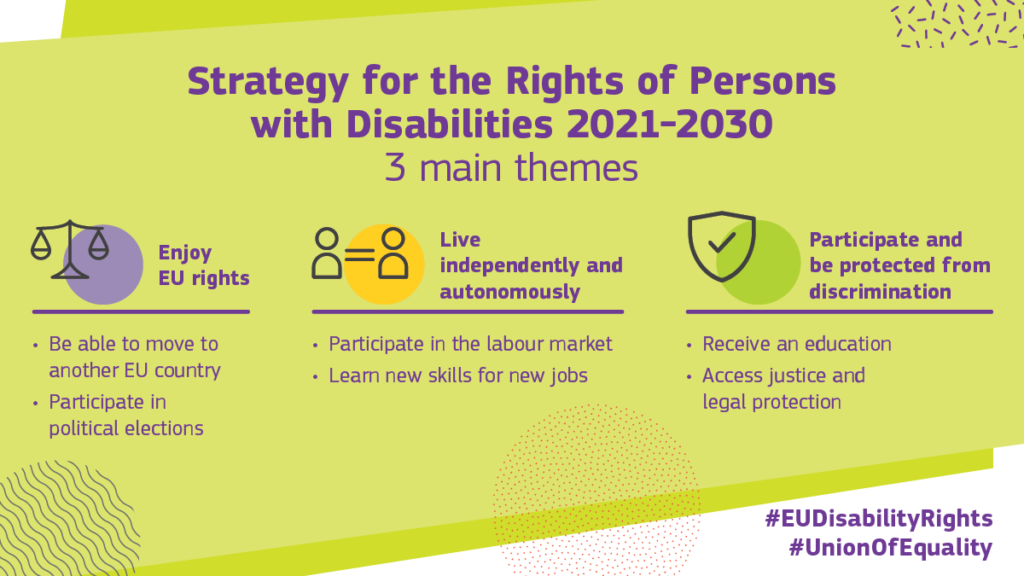The European Commission presents an ambitious Strategy for the Rights of Persons with Disabilities 2021-2030 (Easy-to-read version) to ensure their full participation in society. The new strategy builds on its predecessor, the European Disability Strategy 2010-2020, and contributes to the implementation of the European Pillar of Social Rights.
The evaluation of the European Disability Strategy 2010-2020 shows that it contributed to improving the situation in a number of areas, in particular accessibility for persons with disabilities and promoting their rights by putting disability high on the EU agenda. However, persons with disabilities still face considerable barriers in access to healthcare, education, employment, recreation activities, as well in participation in political life.
87 million persons in the EU have some form of disability. 50.8% of persons with disabilities are in employment compared to 75% without disabilities. 28.4% of persons with disabilities are at risk of poverty or social exclusion compared to 17.8% of persons without disabilities. Only 29.4% of persons with disabilities attain a tertiary degree compared to 43.8% of those without disabilities and 52% of persons with disabilities feel discriminated against.
The new Strategy aims to improve the lives of persons with disabilities in the coming decade, in the EU and beyond. The objectives of this Strategy can only be reached through coordinated action at both the national and EU level, with a strong commitment from the Member States and regional and local authorities to deliver on the actions proposed by the Commission.
“Persons with disabilities have the right to have good conditions in the workplace, to live independently, to equal opportunities, to participate fully in the life of their community. All have a right to a life without barriers. And it is our obligation, as a community, to ensure their full participation in society, on an equal basis with others.” Commission President von der Leyen
Enhancing equal participation and non-discrimination
The new, ten-year strategy sets out key initiatives around three main themes:
- EU rights: Persons with disabilities have the same right as other EU citizens to move to another country or to participate in political life. Building on the experience of the pilot project ongoing in eight countries, by the end of 2023 the European Commission will propose a European Disability Card for all EU countries that will facilitate mutual recognition of disability status between the Member States, helping disabled people enjoy their right of free movement. The Commission will also work closely with the Member States to ensure the participation of persons with disabilities in the electoral process in 2023.
- Independent living and autonomy: Persons with disabilities have the right to live independently and choose where and with whom they want to live. To support independent living and inclusion in the community, the Commission will develop guidance and launch an initiative to improve social services for persons with disabilities.
- Non-discrimination and equal opportunities: The strategy aims to protect persons with disabilities from any form of discrimination and violence. It aims to ensure equal opportunities in and access to justice, education, culture, sport and tourism. Equal access must also be guaranteed to all health services and employment.
“People with disabilities should be able to participate equally in all areas of life. Living independently, learning in an inclusive environment, and working under appropriate standards are conditions that we need to ensure to all citizens to enable them to flourish and live life to the fullest.” Commissioner Helena Dalli

Flagship projects
To foster the inclusion of persons with disabilities the Commission will propose several flagship initiatives, for example:
AccessibleEU
In 2022 the Commission will launch a European resource centre AccessibleEU to increase coherence in accessibility policies and facilitate access to relevant knowledge. This cooperation framework will bring together national authorities responsible for implementing and enforcing accessibility rules with experts and professionals from all areas of accessibility, to share good practices across sectors, to inspire policy development at the national and EU level, as well as to develop tools and standards aiming to facilitate implementation of EU law. The Commission will start preparations for AccessibleEU within the newly established Disability Platform.
European Disability Card
Free movement of persons is a right of every EU citizen. The Commission will propose a European Disability Card recognised by all Member States, that will make it easier for persons with disabilities to exercise their right to move freely. The Commission will propose creating a European Disability Card by end of 2023 with a view to be recognised in all Member States. It will build on the experience of the ongoing EU Disability Card pilot project in eight Member States and upon the European parking card for persons with disabilities.
Working together
- Member States are encouraged to reinforce actions for persons with disabilities, including those launched through this strategy, to make the best use of EU funds in a disability inclusive manner, and progress on the implementation of the UN Convention.
- The European Commission will reinforce the mainstreaming of disability matters in all EU policies and promote the rights of persons with disabilities globally.
- Persons with disabilities will be part of the dialogue and part of the process.
Further reading
Union of Equality: Strategy for the Rights of Persons with Disabilities 2021-2030
Easy-to-read version: Strategy for the rights of persons with disabilities 2021-2030
Factsheet: Strategy for the Rights of Persons with Disabilities 2021-2030
What is the European Union in Easy-to-read
Visit our dedicated page about the EU disability strategy.
Learn more on #EUDisabilityRights!
Communication on the strategy: https://t.co/DirDHZBQ2y
Easy-to-read version: https://t.co/J0WtlV7Nbj
Q&A: https://t.co/v9Zsy49pVu
Factsheet: https://t.co/9Wnmsasw6D
News in easy-to-read: https://t.co/B7oSTmUbfp pic.twitter.com/2dEJgHVnEW— EU Social 🇪🇺 (@EU_Social) March 3, 2021





